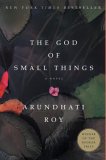Summary | Excerpt | Reading Guide | Reviews | Read-Alikes | Genres & Themes | Author Bio

In a book club? Subscribe to our Book Club Newsletter!
Please be aware that this discussion guide will contain spoilers!
"May in Ayemenem is a hot, brooding month."
"Tomorrow."
Between this remarkable novel's first and last sentences, between May 1992 and December 1969, between the freighted present and past elusive hope, Arundhati Roy constructs a tale as far reaching and sensuous as myth, as inescapable as history, as passionate as the loves that impel the members of the Kochamma family to their fates. Told mainly from the perspective of 7-year-old Rahel and Estha, "two-egg twins," and from that of Rahel 23 years later, Roy's story focuses on two tragic events in 1969-the drowning of the twins' 9-year-old Anglo-English cousin, Sophie Mol, and the murder of Velutha, the Untouchable carpenter beloved by the twins and their divorced mother, Ammu. Moving back and forth through time, guiding us through the many-splendored mansion of her tale, Roy ingeniously reveals-chamber by chamber, heartbeat by heartbeat-the details, the "small things" that fill her characters' lives and furnish the dwellings that cannot protect them.
Topics for Discussion:
Unless otherwise stated, this discussion guide is reprinted with the permission of Harper Perennial. Any page references refer to a USA edition of the book, usually the trade paperback version, and may vary in other editions.
The fact of knowing how to read is nothing, the whole point is knowing what to read.
Click Here to find out who said this, as well as discovering other famous literary quotes!
Your guide toexceptional books
BookBrowse seeks out and recommends the best in contemporary fiction and nonfiction—books that not only engage and entertain but also deepen our understanding of ourselves and the world around us.